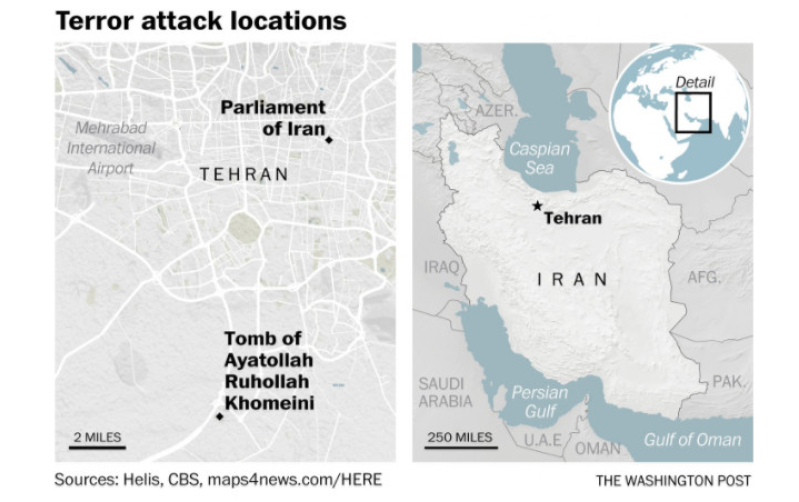
The Islamic State (IS) might be on the retreat in terms of territory held, but the very idea of establishing an Islamic caliphate in the modern day continues to find breeding ground in new areas, including places in South East Asia. The latest IS attacks have actually happened right in the heart of Tehran, Iran, itself. This is a startling development, taking into consideration how IS has always had Iran and its allies as a target for years, although sporadic attacks have always been launched from a distance. Affected countries include Iraq (after Saddam Hussein has been deposed) and in Syria, where government troops there are aided by Iranian forces.
In the middle of this week, the dynamics changed dramatically. Bloodshed came knocking on Tehran’s door, where in a matter of a few hours, what was normally experienced in other Western countries, also happened in Tehran. The capital of the once mighty Persian empire had to go through two separate but deadly violence by IS operatives, and no doubt this is part of the deadly Ramadan bombathon.
Deemed to be the very first major assaults in Iran that the IS actually took responsibility for, it actually managed to break the idea that this rag tag group of militants were unable to have the skill nor expertise to pierce through Iran’s vaunted security forces. Reality proved to be very different, as the death toll stood at 12 with 42 wounded in the twin assaults that happened in the parliament building as well as outside the tomb Ayatollah Khomenei, the leader of the Islamic revolution back in 1979. While all four assailants who participated were eventually killed by security forces, further information will have to be cleaned from the five suspects who have been picked up and interrogated.
No doubt that the interrogation process is not going to follow a civil discussion, and chances are torture will be involved. Even the most developed countries, at desperate times, might resort to breaking international convention and indulge in questionable methods when extracting information from their captured prisoners or enemies.
These attacks do point out that the IS has a beef with virtually everyone -- from world superpowers like the US to its Western allies such as the UK (the recent Manchester bombing and London Bridge attack comes to mind), Marawi city in the Philippines , to the rest of the Muslim world that is seen to be practicing an impure version of Islam that only IS is able to establish.
“The enemy of my enemy is my friend” will not be applied here where Iran and US are concerned, since the US recently enhanced their bilateral relationship with Saudi Arabia, the main enemy of Iran. Saudi Arabia is the stronghold of Sunni Islam, and has used its petro-dollars over the past few decades to spread its version of Islam under the Wahhabi ideology, which is in stark contrast to Iran’s Shiite influence.
However, to see Saudi Arabia football players being disrespectful of the minute’s silence held in a World Cup qualifying match against Australia goes to show just what Saudi Arabia thinks of the lives of non-Muslims lost in the recent London Bridge massacre that was perpetrated by IS. After all, you can say that IS is a purer version of Saudi Arabia’s brand of Wahhabism, and it would be poetic justice when Saudi Arabia’s chickens come home to roost in the future if IS sweeps across the other Sunni-majority countries in the Middle East.
President Trump did issue a statement from the White House, “We grieve and pray for the innocent victims of the terrorist attacks in Iran, and for the Iranian people, who are going through such challenging times. We underscore that states that sponsor terrorism risk falling victim to the evil they promote.”






